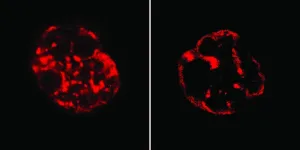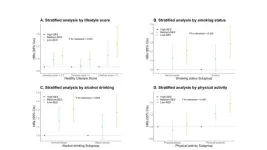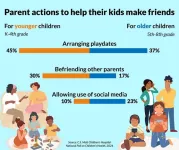(Press-News.org) Imagine you’re looking at millions upon millions of mysterious genetic mutations. With CRISPR gene-editing technology, a select few of these mutations might have therapeutic potential. However, proving it would mean many thousands of hours of lab work. Just figuring out which ones are worth exploring further would take a lot of time and money. But what if you could do it in the virtual realm with artificial intelligence?
CREME is a new AI-powered virtual laboratory invented by Cold Spring Harbor Laboratory (CSHL) Assistant Professor Peter Koo and his team. It allows geneticists to run thousands of virtual experiments with the click of a button. Now, scientists can use it to begin identifying and understanding key regions of the genome.
The program is modeled after CRISPR interference (CRISPRi), a genetic perturbation technique based on CRISPR. CRISPRi allows biologists to turn down the activity of specific genes in a cell. CREME lets scientists make similar changes in the virtual genome and predicts their effects on gene activity. In other words, it’s almost like an AI version of CRISPRi.
“In reality, CRISPRi is incredibly challenging to perform in the laboratory. And you’re limited by the number of perturbations and the scale. But since we’re doing all our perturbations [virtually], we can push the boundaries. And the scale of experiments that we performed is unprecedented—hundreds of thousands of perturbation experiments," explains Koo.
Koo and his team tested CREME on another AI-powered genome analysis tool called Enformer. They wanted to know how Enformer’s algorithm makes predictions about the genome. Questions like that are central to Koo’s work, he says.
“We have these big, powerful models. They’re quite compelling at taking DNA sequences and predicting gene expression. But we don’t really have any good ways of trying to understand what these models are learning. Presumably, they’re making accurate predictions because they’ve learned a lot of the rules about gene regulation, but we don’t actually know what their predictions are based off of.”
With CREME, Koo’s team uncovered a series of genetic rules that Enformer learned while analyzing the genome. That insight may one day prove invaluable for drug discovery. “Understanding the rules of gene regulation gives you more options for tuning gene expression levels in precise and predictable ways,” says Koo.
With further fine-tuning, CREME may soon set geneticists on the path to discovering new therapeutic targets. Perhaps most impactfully, it may even give scientists who do not have access to a real laboratory the power to make these breakthroughs.
END
Is CREME AI’s answer to CRISPR?
2024-09-16
ELSE PRESS RELEASES FROM THIS DATE:
Interrelated social factors may affect cardiovascular health in Asian American subgroups
2024-09-16
Statement Highlights:
There are a variety of interrelated social and structural factors that contribute to differences in cardiovascular health among Asian Americans, and these factors are likely different within individual Asian ethnic subgroups.
Asian Americans and Asian immigrants are quite diverse and comprise many ethnic groups.
Social determinants, such as immigration-related factors, discrimination, socioeconomic status, English proficiency and cultural beliefs, may influence health behaviors, access to health care and the ability ...
New insights into DNA organization during embryonic development
2024-09-16
Researchers from the Kind Group have gained new insights into the mechanism behind the spatial organization of DNA within the cells of early embryos. When an embryo is first formed after fertilization, each cell has the potential to become any cell type of the body. The researchers have studied the spatial organization of DNA that is so particular to these early developmental stages. The paper was published in Nature Genetics on September 16th, 2024.
Every cell in our body contains the same DNA. ...
Socioeconomic inequality linked to increased risk of age-related macular degeneration
2024-09-16
A recent study conducted by researchers from Shanghai Jiao Tong University School of Medicine and Fudan University has revealed a significant association between socioeconomic status (SES) inequality and the risk of developing age-related macular degeneration (AMD). Published in Health Data Science, the study highlights how a healthy lifestyle can mitigate some of the risks associated with low SES.
Socioeconomic disparities have long been a concern in various health outcomes. This study, led ...
Cow slime can help disc herniation patients after surgery
2024-09-16
Researchers at Uppsala University have developed a gel inspired by cow slime for patients suffering from disc herniation. By adding the mucin gel immediately after surgery, it is possible to create a protective barrier around the discs to prevent the immune system from attacking their nucleus pulposus. This keeps the discs intact and reduces the risk of further damage.
“This new approach offers hope for those suffering from back pain caused by disc herniation and may prevent further damage after removing ...
1 in 5 parents worry their elementary and middle school aged kids don’t have friends
2024-09-16
ANN ARBOR, Mich. – Developing friendships is often seen as a natural part of childhood but it may be easier for some kids than others.
And many parents worry about their children’s friendships, according to the University of Michigan Health C.S. Mott Children’s Hospital National Poll on Children’s Health, with one in five saying their child ages six to 12 has no friends or not enough friends.
Ninety percent of parents believe their child would like to make new friends.
“Friendships can play a significant role in children’s overall health and development, emotional well-being, ...
AI-based tool reduces risk of death in hospitalized patients
2024-09-16
Can artificial intelligence (AI) help reduce deaths in hospital? An AI-based system was able to reduce risk of unexpected deaths by identifying hospitalized patients at high risk of deteriorating health, found new research published in CMAJ (Canadian Medical Association Journal) https://www.cmaj.ca/lookup/doi/10.1503/cmaj.240132.
Rapid deterioration among hospitalized patients is the primary cause of unplanned admission to the intensive care unit (ICU). Previous research has attempted to use technology to identify these patients, but evidence is mixed about the application of prediction tools to ...
Replacing ultra-processed foods in diet reduces type 2 diabetes risk
2024-09-15
People who eat more ultra-processed foods (UPF) are at increased risk of developing type 2 diabetes, but this risk can be lowered by consuming less processed foods instead, finds a new study led by researchers at UCL.
The study, published in The Lancet Regional Health – Europe in collaboration with experts at the University of Cambridge and Imperial College London, investigated the relationship between the degree of food processing and type 2 diabetes risk, including which kinds of UPF were most high-risk.
The team analysed UPF intake and health outcomes for 311,892 individuals from eight European countries over 10.9 years on average, during which time 14,236 people developed type 2 ...
High-Dose vitamin D3 does not provide benefit for metastatic colorectal cancer
2024-09-15
RESEARCH SUMMARY
Study Title: SOLARIS (Alliance A021703): A multicenter double-blind phase III randomized clinical trial of vitamin D combined with standard chemotherapy plus bevacizumab in patients with previously untreated metastatic colorectal cancer.
Publication: European Society for Medical Oncology 2024 Abstract LBA26
Dana-Farber Cancer Institute authors: Kimmie Ng, MD, MPH, Nadine McCleary, MD, MPH, Jeffrey A. Meyerhardt, MD, MPH
Summary: A double-blind randomized phase 3 clinical trial led by Dana-Farber Cancer Institute researchers and conducted across several hundred cancer centers in the U.S. tested the addition of high-dose ...
Long-term metastatic melanoma survival dramatically improves on immunotherapy
2024-09-15
Long-term data from a landmark international trial show about half of patients with metastatic melanoma treated with a combination of immune checkpoint inhibitors survive cancer-free for 10 years or more, according to a new report from Weill Cornell Medicine and Dana-Farber Cancer Center investigators and their colleagues.
The 10-year follow-up study, published Sept. 15 in the New England Journal of Medicine, will bring the phase 3 CheckMate 067 trial to a close. The trial, which followed 945 patients treated at 137 sites in 21 countries, demonstrated that combining ...
Contrail avoidance is less likely to damage climate by mistake than previously thought
2024-09-15
A new study allays fears that rerouting flights to avoid forming climate-warming contrails could result in inadvertently making climate warming worse.
Researchers from Sorbonne Universite and the University of Reading found that for most flights that form contrails in the North Atlantic, the climate benefit of avoiding the contrail outweighs the extra carbon dioxide emitted from flying a different route.
Contrail avoidance requires comparing the climate impacts of carbon dioxide and contrails, called CO2 equivalence. Different methods have been proposed, and the choice of which has been largely political. Scientists feared that some choices ...





